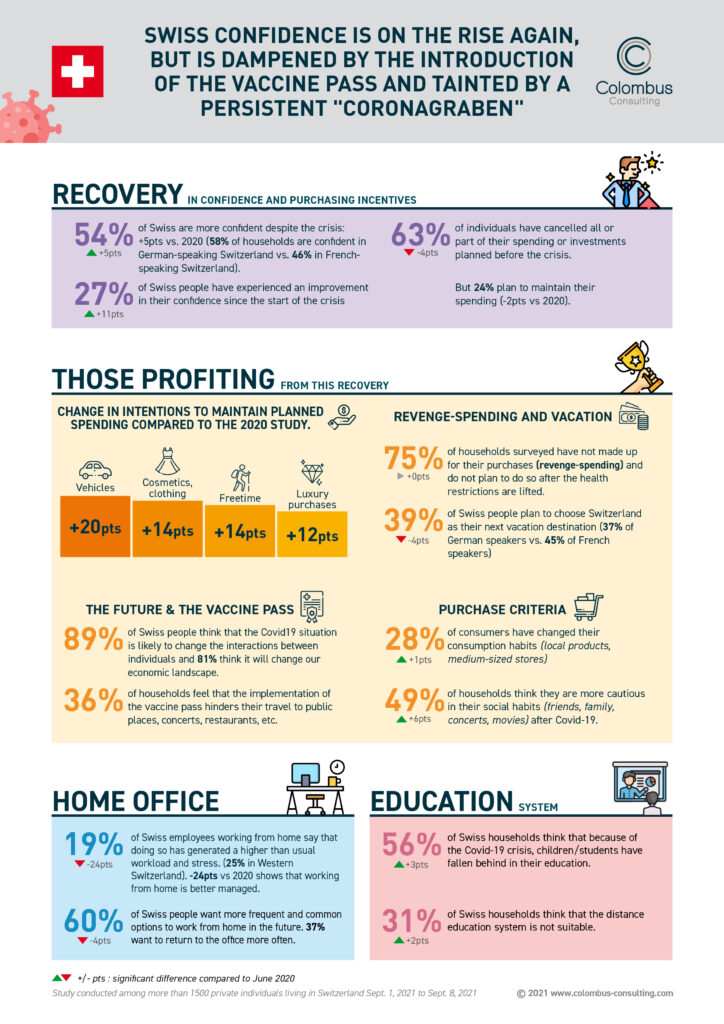Following up on the opinion surveys conducted in the spring of 2020, Colombus Consulting has conducted a new survey of more than 1500 people in Switzerland. The objectives: to gauge consumer confidence after 18 months of a health crisis and to identify trends for 2022. The survey conducted from September 1st to 8th, 2021 shows:
- a clear improvement in confidence (54% +5pts compared to 2020), which bodes well for 2022
- a wait-and-see policy linked to the expansion of the vaccine pass
- consumption has become more digital and more local at the same time
- more relaxed employees (stress at 19%, -24 pts compared to 2020) and a majority of employees preferring to work from home
- strong expectations for an improvement of the distance education system
A return of confidence is clearly more pronounced in the German-speaking part of Switzerland
The study clearly shows a continued increase in confidence (54%, 5 pts), but it also confirms the idea of a “Coronagraben” –
with a different perception between the Italian and Germanspeaking
cantons (12 pts difference in the confidence index, the
German-speaking cantons being more confident).
A strong growth in consumer demand
The study explored several social, economic, political and healthrelated
hypotheses to understand the factors behind this sense of
renewed confidence. First of all, consumers are more inclined to
spend, especially on major investments (cars, housing, etc.) and
on leisure categories (free-time, cosmetics, accessories and
clothing). A certain wait-and-see attitude persists, however, with
75% of those surveyed who believe they have not yet increased
their spending. A regional divide is also present: German-speaking
Switzerland seems to have already increased its spending (15%)
– twice as much as the Italian-speaking cantons (7%).
Digital and local consumption has been confirmed
The changes in purchasing behavior have been confirmed by the
fact that a large part of Swiss people (47%) still want more digital
models for their consumer experience with brands (retailers,
financial services, etc.) and local purchases (30%). Therefore,
consumers are becoming more flexible and are turning,
according to their needs, to the most convenient supplies
(digital), as well as those that make the most sense for them
(local).
The vaccine pass is perceived as an obstacle
The introduction of the vaccine pass has not been well
received: 36% of households believe that the vaccine pass
hinders their travel to public places, concerts, restaurants,
etc. Its implementation in many sectors could therefore
hamper the return of consumption and, more generally,
economic recovery.
Employee stress is down and working from home is still
popular
Employees seem to be more relaxed this fall because the
high level of stress in 2020 has largely subsided (19%, or -24
pts). After more than 18 months of working from home, and
in sectors where the experience is possible, employees are
still in favor of working at home, with 60% of respondents
wishing to see work-from-home possibilities become more
permanent. But there is a growing desire to find a balance
between working from home part-time and being in the office.
In fact, 37% of workers at home want to return to the office
more often, a sign that social ties with the company and its
employees still depend on the office.
The education system is still being harshly judged
Despite a long adjustment process, dissatisfaction with the
education system persists for 31% of Swiss people who want to
see an improvement in distance learning. 56% of respondents
believe that students have fallen behind in their schooling (+3
pts).
The post-Covid-19 era still seems far away
Even though confidence and economic indicators are rapidly
recovering, Swiss consumers and citizens remain critical
and expectant. But they are also realistic about a way out of
the crisis – which they don’t necessarily consider to be
immediate: 89% of those surveyed believe that the Covid-19
situation is likely to change interactions between individuals
in a lasting way, and 81% believe that it will change our
economic landscape. Will 2022 be a more peaceful year of
transition?

Fill in this form to download our study